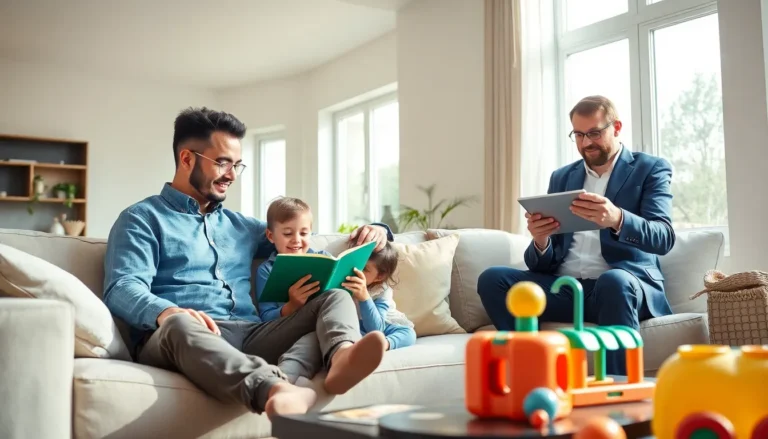Table of Contents
ToggleIn the bustling world of parenting, Ohio’s shared parenting laws are like a superhero cape for co-parents. They swoop in to save the day, ensuring that both parents play an active role in their children’s lives, even after separation. Who knew that navigating custody could be as smooth as a well-planned road trip—minus the backseat bickering?
Overview of Shared Parenting in Ohio
Shared parenting in Ohio encourages both parents to maintain active roles in their children’s lives post-separation. This arrangement supports the notion that children benefit when both parents participate in their upbringing. Ohio law recognizes this principle, aiming to ensure children receive love and guidance from each parent.
The process involves creating a parenting plan that outlines responsibilities and schedules for each parent. Courts prioritize the child’s best interests, evaluating various factors. These factors include the parents’ ability to cooperate and the child’s relationship with each parent.
Shared parenting typically leads to more balanced custody agreements. Each parent shares decision-making authority regarding their children’s education, healthcare, and daily activities. Evidence suggests children thrive in stable environments where both parents are involved.
In Ohio, laws facilitate communication between co-parents, emphasizing collaboration over conflict. Numerous resources exist to assist parents in developing effective parenting plans. Mediation services often help resolve potential disputes, fostering amicable relationships.
Support groups and online forums also provide valuable insights for co-parents navigating shared parenting. Strategies from experienced parents can shed light on managing challenges effectively. Knowledgeable professionals frequently contribute to discussions, offering legal information and emotional support.
Research shows that children in shared parenting arrangements experience less emotional distress. Studies indicate they often perform better academically and socially compared to those in sole custody situations. Thus, Ohio’s shared parenting laws not only promote parental involvement but also prioritize children’s well-being.
Legal Framework of Shared Parenting
Ohio’s legal framework for shared parenting establishes guidelines that support co-parenting relationships, ensuring both parents remain engaged in their children’s lives after separation.
Ohio Revised Code
The Ohio Revised Code outlines shared parenting principles under Section 3109.04. This law emphasizes the importance of both parents having substantial involvement in their children’s upbringing. Courts prioritize children’s best interests when issuing shared parenting orders. Factors like parental cooperation and the quality of the child’s relationship with each parent play significant roles in decisions. Additionally, the code mandates the creation of a detailed parenting plan, which clarifies each parent’s responsibilities and schedules. Thoroughly addressing these elements creates a structured environment that fosters cooperation and minimizes conflict.
Key Legal Terms
Understanding specific legal terms related to shared parenting enhances comprehension of Ohio’s laws. “Shared parenting” refers to a custody arrangement that involves both parents participating equally in decision-making and care. “Parenting plan” describes a formal document outlining the parenting arrangement, including visitation schedules. “Best interest of the child” is a crucial standard guiding all custody decisions, influencing outcomes based on the child’s needs. Familiarity with these terms enables parents to navigate the legal landscape effectively and advocate for their rights and responsibilities while ensuring their children’s well-being.
Benefits of Shared Parenting
Shared parenting provides numerous advantages for families. Both children and parents experience significant benefits through this arrangement.
For Children
Children in shared parenting arrangements benefit from increased stability and emotional support. Studies show that they encounter less emotional distress compared to those in sole custody situations. Academic performance often improves due to the support of both parents, who contribute to educational involvement. Socially, children develop better relationships with their peers, fostering well-rounded personalities. Having access to both parents allows for diverse experiences, helping children acquire skills and values from each parent’s unique perspective. This setup encourages stronger familial bonds, which are essential for healthy development.
For Parents
Shared parenting empowers parents by allowing equal participation in their child’s life. This shared responsibility promotes cooperation, making co-parenting smoother and less contentious. Parents enjoy the opportunity to make joint decisions regarding education and healthcare, enhancing their partnership. Furthermore, involvement in parenting activities can lead to improved personal satisfaction and reduced stress levels. Available resources, such as mediation services, support collaborative problem-solving and communication skills. This strengthens parental relationships, fostering a healthier co-parenting environment that ultimately benefits everyone involved.
Challenges of Shared Parenting
Shared parenting in Ohio presents unique challenges that co-parents need to navigate. Understanding these challenges can help maintain successful arrangements.
Common Misconceptions
Many people mistakenly believe shared parenting means splitting time equally. In reality, shared parenting focuses on both parents actively participating in their child’s life, regardless of time division. Some assume this arrangement diminishes parental authority. It doesn’t; both parents hold decision-making power in key areas like education and healthcare. Another misconception is that shared parenting guarantees no conflict. While collaboration is emphasized, disagreements can still arise, necessitating effective communication. Misunderstanding the legal requirements for parenting plans can lead to confusion. Courts prioritize creating a detailed plan, yet many parents overlook this essential step.
Potential Conflicts
Conflicts often arise due to differing parenting styles. Parents may disagree on discipline methods or educational choices, which can create tension. Schedules may also clash, particularly if parents have varying work commitments. Time allocation for holidays and special events often leads to disputes as well. Lack of clear communication exacerbates issues, making it essential for parents to discuss concerns openly. Emotional struggles, such as jealousy or resentment, can impact interactions. Addressing these feelings is crucial for a harmonious co-parenting relationship. Seeking mediation services can provide neutral support, fostering more effective resolutions to conflicts.
Resources for Shared Parenting
Shared parenting in Ohio offers various resources designed to support co-parents as they navigate this complex journey. These resources promote communication, understanding, and collaboration between parents, enhancing children’s well-being.
Support Groups and Organizations
Numerous support groups and organizations cater to shared parenting needs. Local nonprofit organizations, such as the Ohio Association of Family Courts, provide guidelines and educational materials. Online forums enable parents to connect and share experiences. Additionally, workshops focus on skill-building for effective co-parenting, fostering resilience and collaboration. Families can access resources tailored to specific needs, ensuring support throughout the shared parenting journey.
Legal Assistance
Legal assistance plays a crucial role in shared parenting arrangements. Many parents seek help from legal aid organizations that offer consultations and representation. Child custody attorneys specialize in guiding co-parents through Ohio’s legal framework. Understanding parental rights, obligations, and the details of creating a parenting plan can be complex. Resources like the Ohio Revised Code offer insights into relevant laws. Parents can ensure their rights are protected while promoting their children’s best interests by accessing these legal services.
Ohio’s shared parenting laws create a framework that prioritizes children’s well-being while fostering cooperation between co-parents. By encouraging active involvement from both parents, these laws help establish a nurturing environment that benefits children’s emotional and social development.
Navigating the complexities of shared parenting can be challenging, but with the right resources and support, co-parents can build effective communication and collaboration. The emphasis on creating detailed parenting plans and utilizing mediation services ensures that both parents can work together in their child’s best interest.
Ultimately, shared parenting in Ohio not only strengthens family bonds but also sets the stage for healthier co-parenting relationships that contribute to a child’s overall success.





